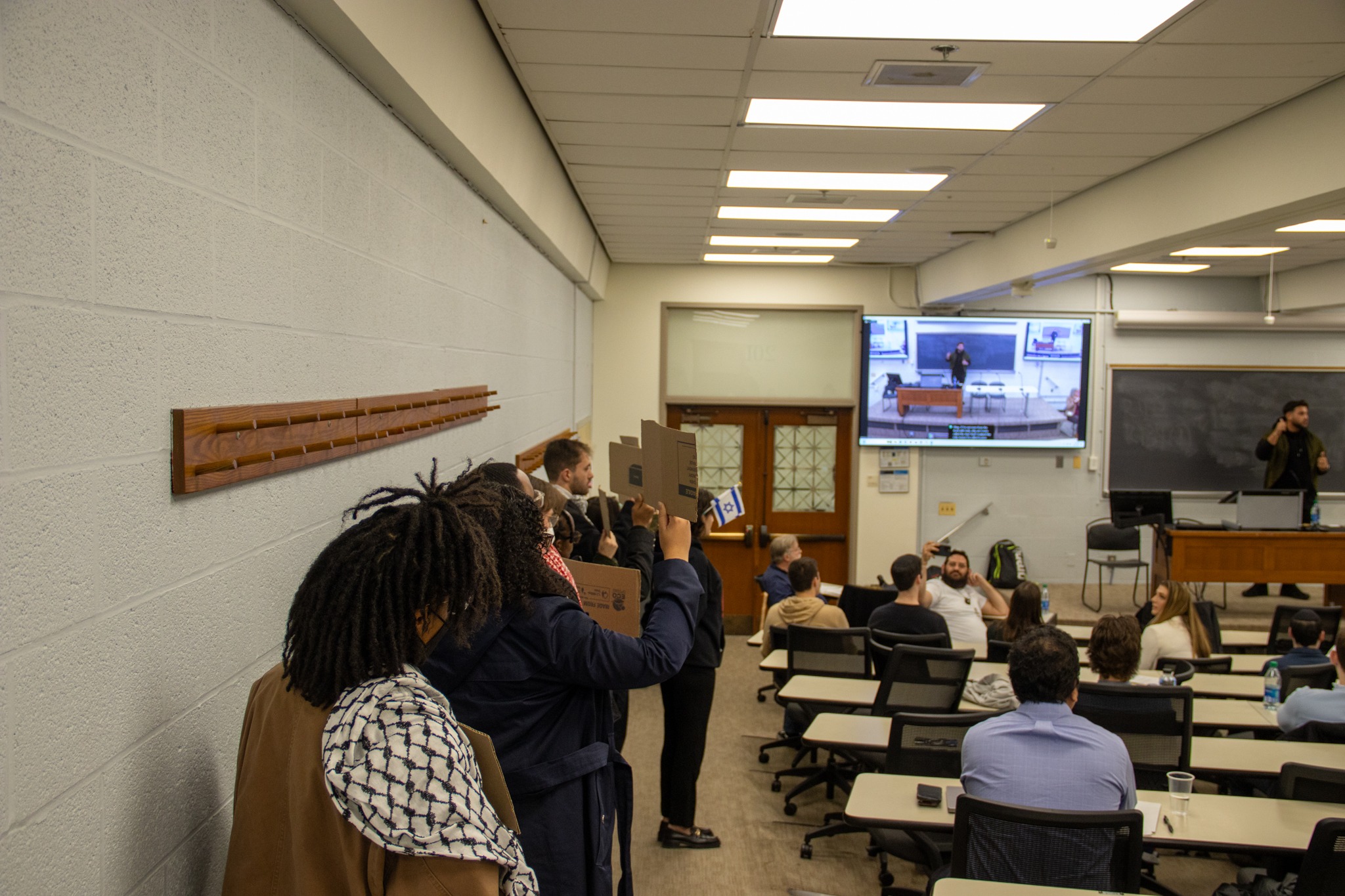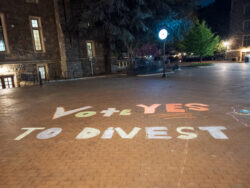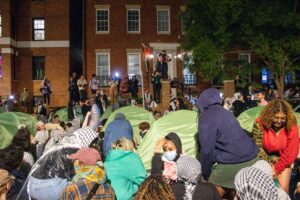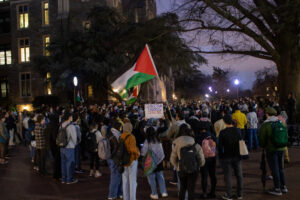Around 70 students and faculty gathered on March 21 to protest a speaker event sponsored by the Georgetown Law Zionists featuring Rudy Rochman, a member of the Israel Defense Forces (IDF). The protest, at the clock tower of Georgetown University Law Center, mirrored the one that occurred on Feb. 27 on the main campus, both prompted by the presence of members of the Israeli military which human rights groups have accused of war crimes.
On Oct. 7, Hamas militants attacked Israel and killed nearly 1,200 people, taking another 240 hostage. Following this attack, Israel launched an invasion and bombardment of the Gaza Strip that has killed more than 32,000 Palestinians and displaced nearly 2 million more in what some experts, including top UN officials, have categorized as genocide.
The March 21 protest was organized by Georgetown Law Students for Justice in Palestine (LSJP), Jewish Students for Justice (JSJ), Jewish Voice for Peace (JVP), and Faculty and Staff for Justice in Palestine (FSJP). Beginning at 7 p.m., between 65 and 75 people gathered by the Gewirz Student Center entrance, across from McDonough Hall, where the event was held. Organizers offered food for iftar as the sun set, and around a dozen Muslim attendees prayed in the grass.
The crowd alternated between chanting and listening to speakers. Their chants, which could be heard from inside the room where the speech was held, denounced the IDF as well as Georgetown for hosting Rochman.
Speakers at the protest condemned the military actions Rochman’s unit participated in over the past few months, suggesting that he may have been directly involved in the killing of a number of civilians, including some children, as part of his IDF service.
Rudy Rochman returned to active duty as a sniper in the IDF’s 98th Paratrooper Division following Oct. 7. The division was the first to invade the southern Gaza city of Khan Younis in December 2023.
The IDF designated Khan Younis as a safer zone for Palestinians fleeing Northern Gaza, which Israel invaded first. Still, Israel’s air and artillery bombardment included strikes on United Nations Relief and Works Agency-run schools which killed and injured dozens of men, women, and children. Protesters of the event expressed concern about Rochman’s presence given his involvement in the ground invasion and the high civilian death toll there, regardless of the exact extent of his individual actions.
Rochman speaks on college campuses around the United States. He was born in France, but moved to Israel at the age of 3 and to the U.S. 2 years later. He spoke about his first experience with antisemitism at 7 years old, where his mom was thrown off a bus for wearing a shirt with Hebrew writing.
He also discussed his service in the IDF from 2011 to 2013, and following Oct. 7, when he returned to active duty.
“When I was 17 years old, I graduated high school, I moved to Israel, I served in the IDF,” Rochman said at the event. “I served as a paratrooper, I defended my country, and I’m very proud to do so, although I hope one day that there will be no more war.”
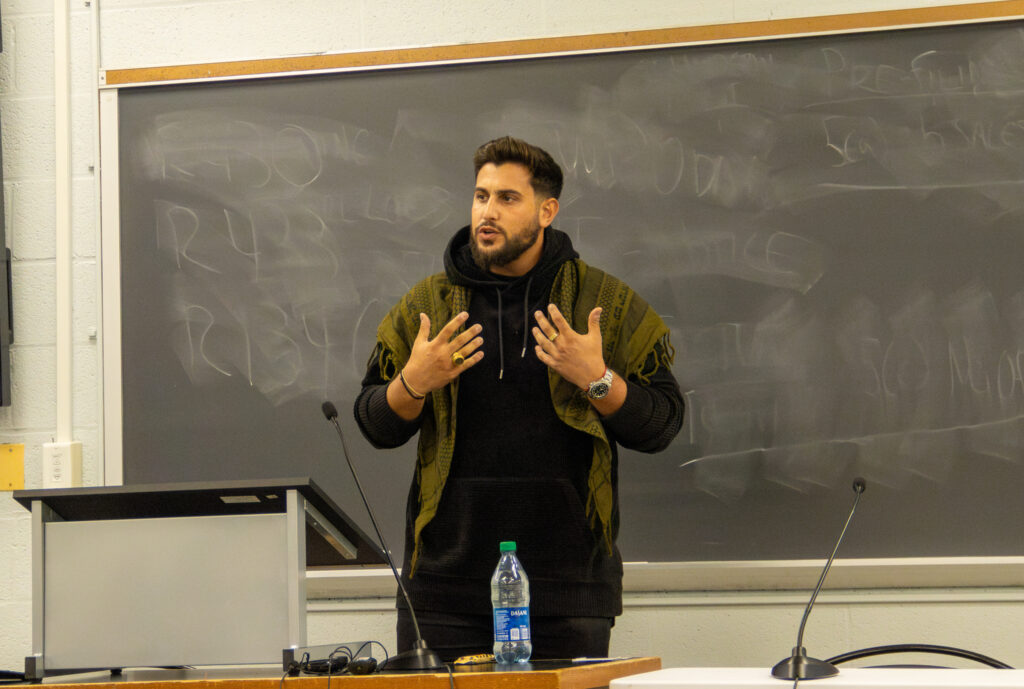 Photo by Connor Martin
Photo by Connor Martin
Rochman’s address at the law center comes three weeks following the Feb. 27 panel featuring three current and former IDF soldiers on main campus, which was organized by Jewish Life, a branch of Campus Ministry, and the Georgetown Israel Alliance. Over 250 students protested the event, marching from Red Square to outside the MSB, where the panel was held.
Several of Thursday’s speakers at the protest noted that it was the second time in the past month that a student group has brought IDF soldiers to speak at Georgetown.
“It makes you feel like your voice isn’t being heard, it makes you feel not supported,” an LSJP representative said, referencing the choice to hold another such event following the resistance to the first. “It’s disheartening.”
The Thursday event was titled: “The Intersection of Judaism and Zionism: Israeli Perspectives of the War On Hamas and Hezbollah.” Julia Wax Vanderwiel, president of the Georgetown Law Zionists, introduced Rochman.
“We are not Jews with cowering knees. We believe in a world where we can strive for the peace and unity of all individuals. We believe in your right to exercise free speech and we believe in our right to do the same,” Wax Vanderwiel wrote in an email to LSJP and the Voice.
Five minutes into Rochman’s speech, one student stood up with a sign reading, “IDF OFF CAMPUS.” Within the next five minutes, 10 students stood on the side of the room silently protesting the event with matching signs and keffiyehs.
The protesters continued standing as one event participant stood in front of them, blocking their view of Rochman with a sweatshirt reading, “Bring them home now,” referring to the hostages have yet to be released by Hamas: as The Washington Post estimates, 97 remain alive and 33 bodies are also still being held. The same participant followed the silent protesters as they were leaving the room, throwing one of their signs at them.
After leaving, the protesters inside joined the students outside, and two of them came in front of the crowd and shared what the event was like.
“Inside, we stood in silence as those who support Israel clapped and cheered at the mere mention of what Rudy Rochman does for the Israeli military,” Josh, a member of JSJ who only identified himself by his first name, told the crowd. “They were proud of what he has done.”
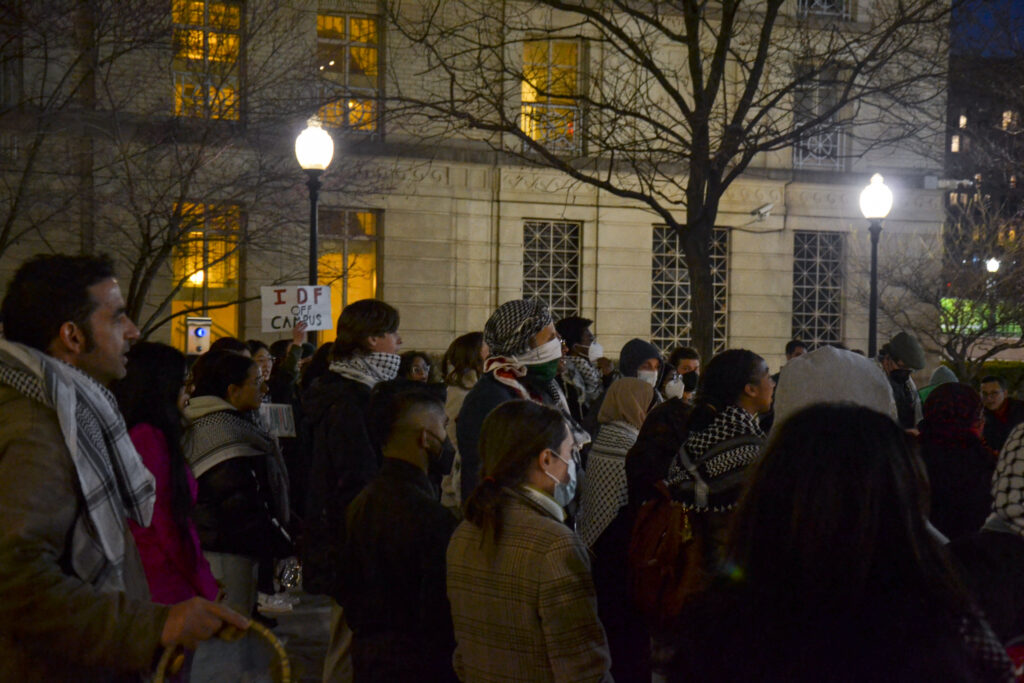 Photo by Graham Krewinghaus
Photo by Graham Krewinghaus
LSJP protesters wrote a letter to William Treanor, Dean of the Georgetown University Law Center, on Monday that called on the university to denounce the presence of IDF soldiers on-campus who are implicated in war crimes and genocide.
“Mr. Rochman’s presence on campus and the message of his scheduled event will create a hostile environment and threaten the sense of safety of GULC students of Palestinian descent who are currently witnessing the destruction of their homeland and the devastation of their people,” LSJP wrote on March 18.
Three hours before the event, Rochman issued a letter in response to LSJP’s planned protest, which was shared on Instagram and emailed to LSJP and the Voice. The letter described Rochman’s disapproval of the protests and faith in the ability of Israelis and Palestinians to come together for peace.
Beyond their direct protest of Rochman’s invitation, protestors also condemned Georgetown’s refusal to call for a ceasefire or take other actions, such as divesting their endowment from companies with ties to the Israeli military.
During the evening protest, one speaker, who declined to share his name, described the case of Nadera Shalhoub-Kevorkian, a professor at Jerusalem’s Hebrew University who was suspended earlier this month for publicly labeling the Israeli occupation as a genocide and calling for a ceasefire.
“We are all complicit—Georgetown Law actually has a study abroad connection with Hebrew University,” he said. “GULC’s mission statement is, ‘law is but the means, justice is the end.’ We’ve all heard it a million times. But how can we learn towards that goal in a country like Israel?”
The speaker echoed LSJP’s previous statement that Rochman’s presence on campus put Palestinian and Arab students in danger and denounced the university for allowing the event to take place.
“Bringing him to campus is inconsistent with Georgetown Law’s values, and it actively threatens the safety of Arab students on campus,” he said.
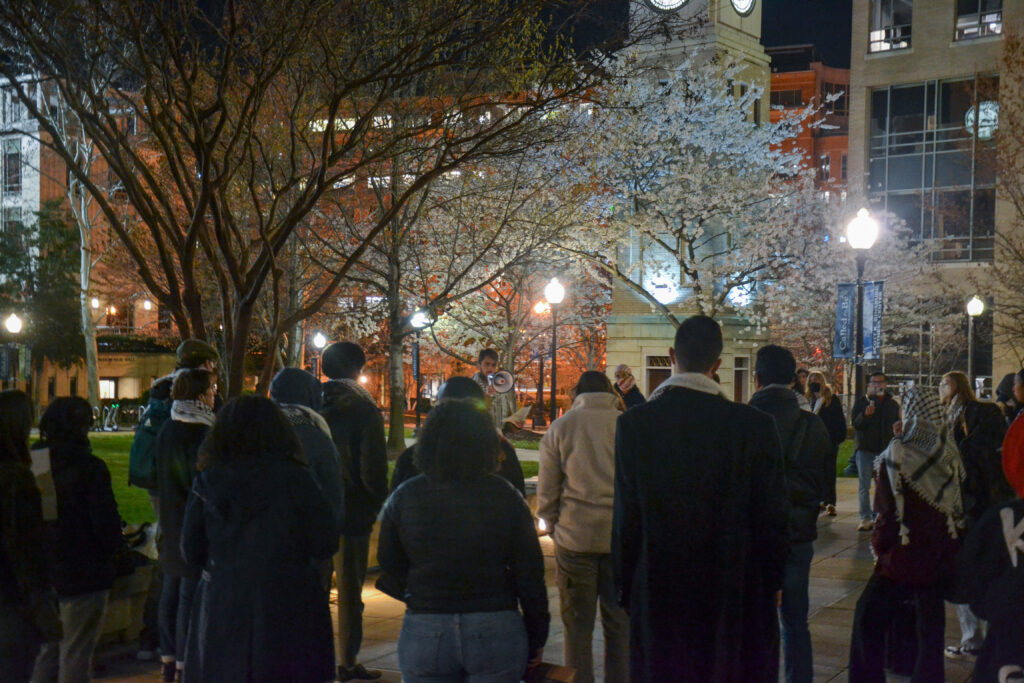 Photo by Graham Krewinghaus
Photo by Graham Krewinghaus
Editor’s note: This article was corrected on Monday, March 25 at 4:47 p.m. to reflect that the attendee’s sweatshirt read, “bring them home now”, rather than “bring them back now.” Additional information was also added to note the 33 bodies Hamas is holding in captivity as of recent estimates, bringing the total of hostages not yet released to 130.


